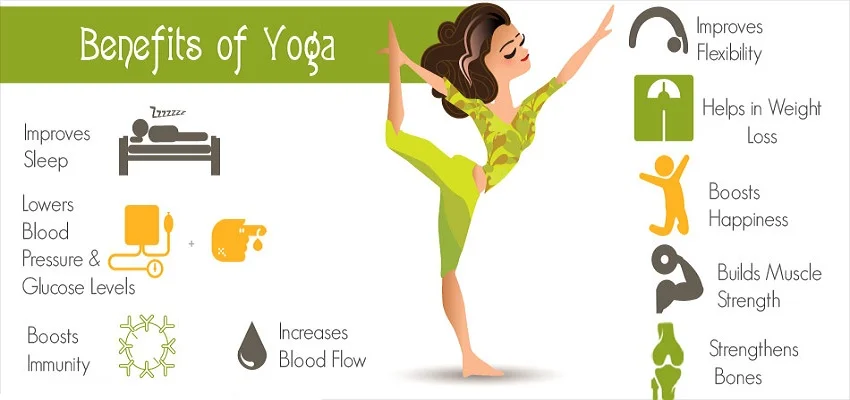
Yoga, an ancient practice rooted in Indian philosophy, has evolved into a popular and scientifically backed form of exercise and meditation worldwide. Beyond its spiritual origins, yoga is now widely recognized for its profound impact on physical and mental well-being. Whether you’re a seasoned yogi or a curious beginner, understanding the multifaceted benefits of yoga can help you make the most of this practice. In this comprehensive guide, we’ll explore the diverse health benefits of yoga and how to incorporate it into your daily routine.
Physical Health Benefits
1. Improved Flexibility and Strength
One of the most immediate benefits of yoga is increased flexibility. Through a series of poses (asanas), yoga stretches and lengthens muscles, which can lead to improved flexibility over time. This increased flexibility reduces the risk of injury and enhances physical performance in other activities.
In addition to flexibility, yoga helps build muscle strength. Unlike weight training, which focuses on isolated muscle groups, yoga engages multiple muscle groups simultaneously, promoting balanced strength throughout the body. Poses such as Downward-Facing Dog, Plank, and Warrior series are particularly effective in building core strength.
2. Enhanced Respiratory Function
Yoga places a significant emphasis on breath control, or pranayama. Regular practice of pranayama can improve lung capacity, enhance respiratory efficiency, and increase oxygen intake. This improved respiratory function can benefit athletes, people with respiratory conditions like asthma, and anyone looking to enhance their overall health.
3. Better Posture and Alignment
Poor posture is a common issue in today’s sedentary lifestyle, leading to back, neck, and shoulder pain. Yoga encourages proper alignment of the spine, shoulders, and pelvis, which can correct posture and alleviate related discomfort. Over time, consistent practice can lead to better posture in daily life, reducing the strain on muscles and joints.
4. Improved Circulation and Heart Health
Yoga’s combination of movement, stretching, and controlled breathing supports cardiovascular health by improving circulation and reducing stress. Certain styles of yoga, such as Vinyasa and Power Yoga, elevate the heart rate, providing cardiovascular benefits similar to aerobic exercises. Yoga also promotes relaxation, which can lower blood pressure and reduce the risk of heart disease.
Mental Health Benefits
1. Stress Reduction and Relaxation
One of yoga’s most celebrated benefits is its ability to reduce stress. The practice encourages mindfulness, deep breathing, and relaxation, which activate the body’s parasympathetic nervous system (the “rest and digest” response). This can lead to lower cortisol levels, reduced anxiety, and an overall sense of calm. Regular yoga practice is also associated with improved sleep quality and duration.
2. Enhanced Mental Clarity and Focus
Yoga is a powerful tool for enhancing mental clarity and concentration. The focus required to perform poses and maintain balance helps to quiet the mind and sharpen attention. Techniques such as meditation and breath control can further enhance cognitive function and memory, making yoga an excellent practice for improving mental sharpness and productivity.
3. Emotional Balance and Well-being
Yoga encourages a deep connection between the mind and body, fostering self-awareness and emotional balance. The practice promotes the release of endorphins, the body’s natural “feel-good” chemicals, which can alleviate symptoms of depression and anxiety. Additionally, the meditative aspects of yoga can help practitioners process emotions, develop greater self-compassion, and cultivate a positive outlook on life.
Spiritual and Holistic Benefits
1. Mind-Body Connection
Yoga’s holistic approach fosters a deep connection between the mind and body. Through consistent practice, individuals become more attuned to their physical sensations, emotions, and thoughts. This heightened awareness can lead to a greater understanding of oneself, promoting personal growth and self-discovery.
2. Increased Mindfulness and Presence
Mindfulness is a key component of yoga, encouraging practitioners to stay present and fully engage with each moment. This mindfulness can extend beyond the yoga mat, enhancing daily experiences and relationships. By cultivating a mindful approach to life, individuals can reduce reactivity, make more intentional decisions, and experience greater peace.
3. Spiritual Growth
For those interested, yoga can also be a path to spiritual growth. Rooted in ancient Indian philosophy, yoga offers tools for exploring the deeper aspects of existence and the self. Practices such as meditation, chanting, and reflection on yogic texts can provide insights into the nature of the mind, the self, and the universe, fostering a sense of interconnectedness and purpose.
How to Incorporate Yoga Into Your Routine
1. Start Small and Be Consistent
If you’re new to yoga, start with short, manageable sessions that fit into your daily routine. Even 10-15 minutes of practice each day can lead to significant benefits over time. As you become more comfortable, gradually increase the duration and intensity of your sessions.
2. Choose the Right Style
Yoga offers a variety of styles, each with its own focus and benefits. For relaxation and stress reduction, try Hatha or Yin Yoga. If you’re looking for a more dynamic workout, consider Vinyasa or Ashtanga Yoga. Experiment with different styles to find the one that resonates with you.
3. Create a Dedicated Space
Having a dedicated space for your yoga practice can enhance your experience and help you stay committed. Choose a quiet, clutter-free area where you can practice without distractions. Personalize your space with items that inspire relaxation, such as candles, plants, or calming music.
4. Seek Guidance from a Teacher
While online resources and apps can be helpful, working with a qualified yoga instructor can provide personalized guidance and ensure you’re practicing safely and effectively. Consider attending classes at a local studio or booking private sessions to deepen your practice.
5. Integrate Yoga Into Your Lifestyle
Yoga is more than just physical exercise; it’s a lifestyle. Integrate the principles of yoga, such as mindfulness, compassion, and balance, into your daily life. Whether through meditation, mindful eating, or intentional movement, these principles can enhance your overall well-being and enrich your life.
Yoga is a powerful practice that offers a wide range of health benefits, from improved physical strength and flexibility to enhanced mental clarity and emotional balance. By incorporating yoga into your routine, you can unlock its full potential and enjoy a healthier, more fulfilling life. Whether you’re seeking physical fitness, stress relief, or spiritual growth, yoga provides a holistic approach to well-being that can transform your mind, body, and soul.






